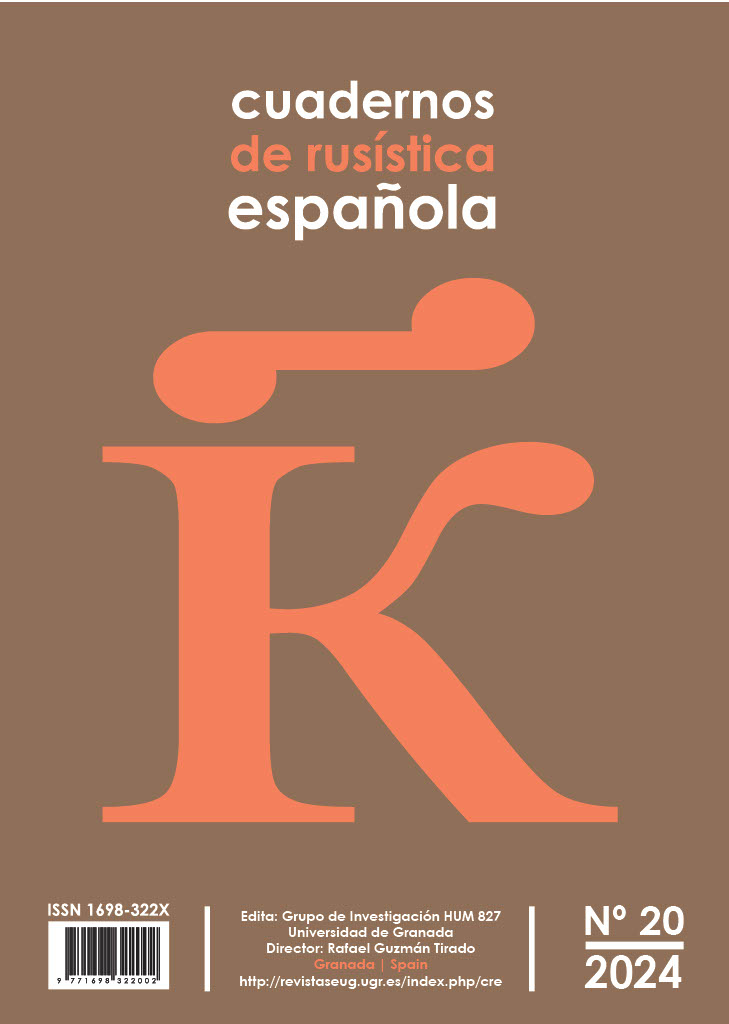From Varna to St. Petersburg: Vectors of Development of Modern Russian Studies
DOI:
https://doi.org/10.30827/cre.v20.31706Palabras clave:
MAPRYAL congresses, modern Russian studies, development vectors, topics of round tables, Russian language and Russian culture, MAPRYAL activitiesResumen
This article discusses the development directions of modern Russian studies over the past 15 years, outlined at the MAPRYAL congresses as the highest international scientific forum of Russianists. Based on scientific reports published following the congresses in Varna (2007), Shanghai (2011), Granada (2015), Nur-Sultan (2019) and St. Petersburg (2023), the vectors of development of modern Russian studies are traced. An extensive review of current scientific research in the field of state language policy, systemic and structural description of the modern Russian language in synchrony and diachrony, communication in Russian in an intercultural environment, comparative study of Russian and other languages in linguistic and methodological aspects is presented and the role and place of the Russian language in interstate communication is discussed. Attention is focused on issues of the Russian world, Russian mentality and Russian culture in the context of globalization. The most discussed issues of the science of translation as a means of interlingual and intercultural communication, as well as the problems of the symbolic nature of the space of Russian literature in terms of national identity are traced. Promising directions for the development of methods for teaching Russian language and literature in modern conditions are identified. The focus is on the current topics of round tables. The constant vectors of development of Russian studies in the last two decades of the 21st century are summarized.
Descargas
Citas
Bkhatnagar, M. (2019): Interv'yu s Vladimirom Il'ichom Tolstym, Prezidentom MAPRYAL. Indian Journal of Russian Studies No. 1 URL: Retrieved from http://ijrs.online/ijrs/index.php/journal-archives/published-volumes/volume-1-2019 (data obrashcheniya: 15.08.2023).
Suleymenova, E. D. (2019): Itogi XIV Kongressa MAPRYAL. Russkoye slovo v mnogoyazychnom mire. URL: https://ru.mapryal.org/filecache/upload/files/%D0%9D%D0%B0%D1%83%D1%87%D0%BD%D1%8B%D0%B5%20%D0%B8%D1%82%D0%BE%D0%B3%D0%B8%20%D0%BA%D0%BE%D0%BD%D0%B3%D1%80%D0%B5%D1%81%D1%81%D0%B0%20%D0%9C%D0%90%D0%9F%D0%A0%D0%AF%D0%9B.pdf (data obrashcheniya: 15.08.2023).
Suleimenova, E. D., Sinyachkin, V. P. (2019): Mir russkogo slova i yego tsennostnoye napolneniye. Cuadernos de Rusística Española, 15, 29–40. https://doi.org/10.30827/cre.v15i0.9241
Verbitskaya, L. A. (2007): Mir russkogo slova i russkoye slovo v mire. Plenarnyi doklad na XI Kongresse MAPRYAL: Materialy XI kongressa Mezhdunarodnoy assotsiatsii prepodavateley russkogo yazyka i literatury, Varna, 17-23 sentyabrya 2007. T. 1. Heron Press, 8-13.
Verbitskdya, L. A. (2015): Russkiy yazyk i literatura v prostranstve mirovoy kul'tury (Po itogam XIII kongressa MAPRYAL). Mir russkogo slova 3, 4-8.
Vladova, I. (2007): Otchet o rabote ХІ kongressa MAPRYAL. Bolgarskaya rusistika 3-4, 5-11.












